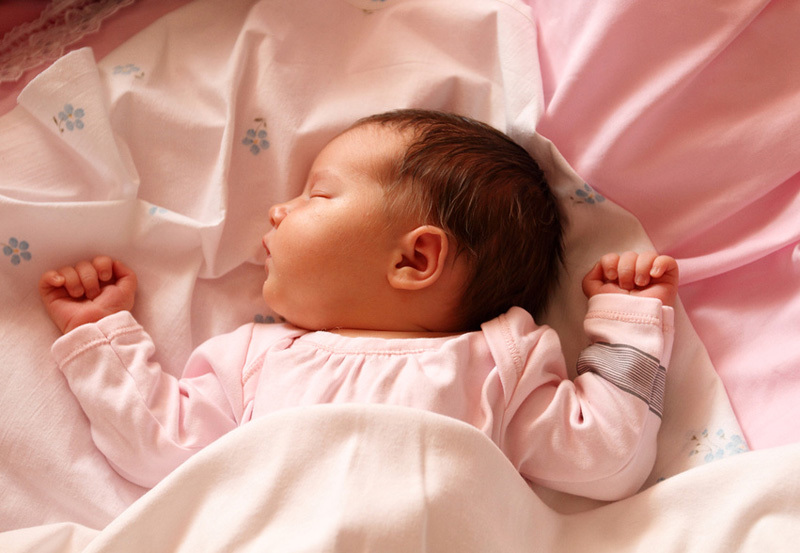In this article we will consider what a child should be able to 1 month.
Content
The first months of the life of the crumbs are the most memorable and exciting for parents, especially the first, because at that time the newborn first enters the parental house and everything happens for him new, and parents notice the first movements, smiles, emotions and sounds.
For parents at this time, everything happens for the first time, but despite the fact that new parents worry about their baby, because It is not always clear why the child is crying or screaming, you should not show his excitement, this may affect the behavior of crumbs, which feels perfectly your mood. In addition to full sleep, nutrition and main care, the baby needs a lot, for example, attention, games, charging, etc.
What should a child be able to 1 month: the main characteristics
For the baby, this period is quite complicated, because A sharp change in the situation, the passage of the birth canal naturally does not pass without a trace. But in the process of getting used to the new world, the baby develops and grows, shows reflexes, which is very noticeable.
Over time, it is noticeable how the baby admires and watches the outside world, despite the fact that vision is not yet developed enough to clearly see everything.
In addition to natural reflexes, the physical and mental health of the crumbs develops rapidly, it plays a huge role for further development, especially if it is given a lot of time and attention. In order to appreciate the capabilities of the child, parents should know what exactly the child should be able to 1 month of life and contribute to the development of these skills.

The first month is the time of adaptation of the child to a completely new world, and therefore is fundamental. The child gets used to the environment, so in the first week the baby loses up to 10% of his weight, but by the end of the month it can rapidly gain weight. After all, the baby tolerates stress during childbirth. Already in the next months of life, the child gains up to 30 g per day, if he is healthy and eats in a timely manner.
Children from birth to 1 month. Boy:
- Weight-2.9-3.9 kg
- Head circumference-33, 2-35.7 cm
- Growth-48-52 cm
- The girth of the chest is 31.7-37.8 cm.
Girl:
- Weight-2.8-3.7 kg
- Head circumference-32.7-35.1 cm
- Growth-47.3-51 cm
- The girth of the chest is 31-37 cm.
What should a child be able to 1 month:
From birth, the baby can suck the chest well, but after a few days, you will notice how the baby independently captures the chest, albeit with your help. And when you touch the handle of a newborn with a finger, he involuntarily clench it into a fist.
- The kid knows how to scare in 1 month, for example, from bright lighting, a lantern, or loud sounds.
- The baby spreads his hands and squeezes them back, thus showing his emotion, but on the face you may not notice changes. This behavior will pass by 5 months. But for a small child, fright is a lot of stress, so you should protect the baby from factors that can scare him.
- Even in the first month, the baby will have a desire to walk. If you lightly put him on the legs, he will begin to walk slowly. But do not rush, because everything has its time. The spine and bones of the baby are too weak, and thus it can be harmful to him.
- The kid still does not know how to hold the head on his own, and the neck is very weak. When you take the baby in your arms, you must definitely support its nape.
- With proper care, nutrition, and if the child is healthy, the newborn sleeps quite a lot, up to about 15 hours a day. But it is important to remember that the baby’s mode may be completely different from yours. And this means that from the first weeks, the child can fall asleep and wake up at all at any time. In the newborn, five stages of behavior are distinguished that will help mom prepare and predict the duration of the crumbs in advance:
- At the stage of deep sleep, the baby is completely relaxed, his eyes are closed, breathing is even.
- Shallow sleep It is characterized by frequent and not very even breathing, arms and legs can twitch, and eyeballs move under the eyelids.
- Small - The eyes are half -closed, and most often it is observed during feeding or before strong falling asleep.
- Wakefulness - Active pastime, when the child moves and considers the environment.
- Cry - caused by discomfort (the baby is hungry, scared or dirty). If the child cries too often, almost continuously, you should see a doctor.

- Moreover, the baby can easily confuse day and night. In order for the child to sleep at night, it is worth spending time actively in the afternoon, and in the evening in a monotonous and boring way, so that the baby calms down and is ready to bed.
- All newborn kids are short -sighted, because In the first month of life, vision is just beginning to develop. The kid sees only those objects or faces who are from him no further than 30-60 cm, while the silhouette is not entirely clear. The child’s vision in the first 3-4 weeks of life is weak, but over time it improves, the main thing is to monitor the reaction of the baby and his reflexes, which will tell you what kind of vision the baby has. At first, the child sees the world in blurry tones and more black and white, but a bright toy, located nearby, will certainly attract his attention.
- From the first weeks, the baby loves to follow movements and faces, repeating movements and facial expressions. The kid in the first month smiles at his mother, shows his tongue and tries to repeat movements. More often a smile occurs arbitrarily, and shows the baby, but for parents it is always a great joy. A smile lasts literally a few seconds, so you can not always see it.
- In the first month of the child’s life, many parents watch how he mowing a little eyes. Thus, the baby is trying to focus his gaze. This is quite normal, because The apparatus of visual control in the baby is not yet developed, but if this continues by 3-4 months, then the child must be shown to the doctor.

- Hearing in a child is also poorly developed. But the baby clearly hears the voices of the parents, to which he is already used to the womb. Also, newborns are characterized by hearing high, piercing sounds, so “lingering” is a great tone for communicating with a child of this age.
- As for the sense of smell and taste receptors, the child perfectly recognizes the smell of breast milk, over time he begins to recognize other smells. A bitter and salty child does not recognize, so only sweet milk or a mixture will be like a baby. These receptors, unlike hearing and vision, are originally developed, but because The kid is not yet familiar with many smells and tastes, for him this is new and of course, if you give the baby other food, he will be afraid and rather will not accept it.
- Crying is perhaps the only way to tell mom about the problem, for example: “I am hungry”, “I have a wet diaper”, “I want to sleep”, etc. Do not worry, because over time you can recognize crying, and understand what a way to calm the baby. The older the child becomes, the easier it is for him to explain about his desires and needs, he begins to communicate with his parents with gestures and sounds, words, etc.

- It is worth remembering that urination in a monthly child is quite frequent, approximately every 10-15 minutes. In this case, the urine should be almost transparent. The minimum amount of urination per day is 6 times.
- The child is eating exclusively by the need. If the child is “hanging on the chest”, you should see enough milk. But there are also cases when the baby has a very well developed sucking reflex and in order to calm down, he constantly requires the breast and the presence of his mother.
- Deflowing of the stomach - up to 12 times, mainly occurs during or after feeding. The infant in a baby is usually yellow without an unpleasant odor.
How does the child know the world in 1 month?
Of course, at first after birth, the baby has nothing to boast of, but this period is incredibly important for a newborn. Starting from the first days, the baby adapts and gets used to new living conditions, a new environment, an environment, etc. But even for such a short period of time, the baby manages to learn something.
What should a child be able to 1 month:
- The child is interested in watching the face or toy that is in front of him.
- Trying to repeat facial expressions, emotions and behavior for his interlocutor, because This is not the first time, the baby often calms down, while they talk to him.
- You can see how the baby moves his lips at a time when they talk to him.
- He listens with curiosity and interest when he talks to or reads with him.
- He tries to participate in the conversation, repeating some sounds for his interlocutor.
- If you abruptly complete the conversation and freeze, the child will also freeze and will carefully observe his interlocutor.
- It distinguishes between bright plain colors, of course, the baby will not call them, but it is these colors that the baby clearly sees, and most often notices them: black, red, white, yellow. In addition, it distinguishes the line and cage.
- He recognizes her mother, her smell and voice, sometimes those relatives who are more often located next to the baby. Therefore, often small children do not go to pens to strangers. It is safer for a child next to a native person.

- By the end of the month, the child is able to concentrate the look on a bright mobile object.
- The kid tries to raise the head lying on his stomach, and holds it up to 5 seconds.
- The child should cry, when he needs something, and do not be upset that the baby screams or cries, because all the newborn is done to transmit information about his needs and desires.
- The child is able to grab a finger and clench his palm in a fist.
- Shows his mood with a smile or crying.
- Reacts to sounds, turning the head in the direction from where the sound is made.
Important baby reflexes at 1 month
- The baby is well developed sucking reflex From birth, but it is also worth developing and often applied to the baby to the chest.
- If you gently touch your finger to your lips, its search reflexes of the chest and milk will increase. Also, the baby should be able to tightly wrap the chest with fingers or hands, this is called ground reflex.

- If the baby is put on the tummy, he involuntarily turns his head to the side, this protective reflexthat will allow the baby not to suffocate. But the baby should sleep on the tummy, because The child will not be afraid and sleep calmly.
- You can put the newborn on the stomach and touch the heels. The child will try to push off. Also, already in the first month of life, the baby, lying on the stomach, can simultaneously raise the ass and head, literally for a few seconds.
- If the baby is easily pressed on his palm, he involuntarily opens his mouth and moves his head, this is called babkina's reflex. You can observe a swimming reflex if the baby is put on the tummy.
The first month is very important for the development of the child, so in the house where the newborn lives, love, warmth and tranquility should reign. During the first weeks of life, the baby is filled with social content, and soon he will react lively to the appeal to him. Therefore, it is very important to talk with the baby and make it clear that there is nothing to be afraid of. Thus, the newborn will rather get used to the new environment and the environment.
First month of the child: development
Changes can be seen not only in development and habits, but also in appearance. The child gradually changes the embryo pose to a more free one, slowly begins to move the limbs, fingers and twist the head. This can be explained by the fact that the baby slowly gets used to new living conditions and feels much calmer and more comfortable.
A newborn child has some puffiness, but by the end of the first month, this feature disappears, and the baby becomes more like dad or mom. Although this “similarity” changes over time.
The full and correct development of the child in the first period of life largely depends on the home environment and on the behavior of the parents. The task of which is to create an atmosphere in a house in which the baby will feel comfortable, calm and protected. It is very important for the child not only full -fledged care, but also physical and mental health that parents are required to provide.
Many believe that children at this age still do not understand much, but do not forget that the baby even feels the mood and emotional state of the mother in the womb. From the first days of life, the child absorbs like a sponge everything that his parents give him, so he is categorically one cannot categorically swear, to raise his voice and show his negative mood. This can negatively affect his further behavior.
Mom for a newborn is very important, so it is worth paying maximum attention to the baby, so the baby will feel protected. With proper care and maximum pastime with the child, he will not disturb you once again and demand your attention.

- Physical development is very important, and because The wakefulness of the crumbs is quite short, it is worth properly distributed for massage, and for games, and for charging. Do not waste time simply, because with every day you can notice new skills in the baby, and in order to contribute to the speedy development and help the child, you need to perform simple exercises and classes. It is useful to maintain the baby's natural reflexes: grabbing, crawling, walking, etc.
- Massage can be done if there are no health deviations, so it is worth discussing this question with the attending physician. Massage has a beneficial effect on muscle tone, and tactile touch will help to establish contact with the mother, which contributes to harmonious physical and mental development.
- It is best if the first time you should do the right specialist to do the first time. Or perform completely simple strokeing movements with the addition of oil.
- In order for the child to develop a well -hearing, and in the future - speech, it is worth talking more with the newborn. Already in the first month, the crumbs will have the experience of an attentive listening when, when talking with his mother, the child freezes and listens.
- Also, for the development of the hearing aid and a sense of rhythm, it is necessary to let the child listen to music. This contributes to the normalization of physiological processes in infancy. Music can sound quietly both during wakefulness and during sleep.
- For physical development, games and classes in water are useful. It is worth lowering the baby gradually so that he is not afraid. It is wonderful if in the first few times the baby will swim with his mother, this will allow him to feel completely protected, and in the future the child will not be afraid of bathing.
- Even such a small child can be put on the tummy, and holding the baby by the chin and chest, and roll all over the bathroom, shaking to the sides and up and down.
- The baby will also like to push off the legs, so it can be leaned against the side of the bathroom with bent legs and allow the child to push away on his own. Also, the baby will quite like “walking on the water”, it is worth taking the child under the mice, and leaning a little forward, give the baby the opportunity to walk around. Thus, you stimulate the reflex of walking.

- Swimming contributes to the development of the vestibular apparatus and a sense of balance, and is also an excellent prevention from many "transport" problems.
- To develop the vision and hearing of the child, games with an ordinary rattle are quite suitable, preferably, it should be very bright or black and white. First, it is worth placing a rattle in front of the child at a distance of 50-70 cm, then you need to wait until the child pays and concentrates attention on it. For that, you need to roll the toy to the sides with an amplitude of 7 cm, slow movements.
- Already closer to the end of the first month, you can make circular movements in a rattle, as well as move it in different directions, bring it closer and move it.
- For example, you need to take the baby in his arms and look intently into his eyes, after some time the child will also look directly into your eyes directly. Even if the baby is distracted, do not stop, this will help the baby learn to concentrate and in the future he will not “mow”.

- And in order to develop visual memory, you need to walk in a child around the house and show him everything, while calling objects and interior details. Of course, the child will not be able to clearly consider everything, but in the future it will be easier for him to remember objects and their name.
- In addition, songs, poems, nursery rhymes and jokes are important for hearing. This is also important for the development of the speech apparatus, as the baby tries to repeat your movements, including their mouth. At the same time, your facial expressions and emotions that the baby also copies.
- They favorably affect the nervous system of the baby touching his mother, her smell and heartbeat, and rhythmic swaying will help the child calm down and fall asleep.
- To develop tactile sensations in the baby, he should give him to touch various fabrics, or let various objects touch. It is important to tell and comment on his actions. This information is important and postponed at the subconscious level. Thus, you can build a foundation for further perception of the world.
Every day you can observe something new in the development of your crumbs, over time its facial expressions, gestures and behavior are developing, which is noticeable already in the first month of the baby's life.






